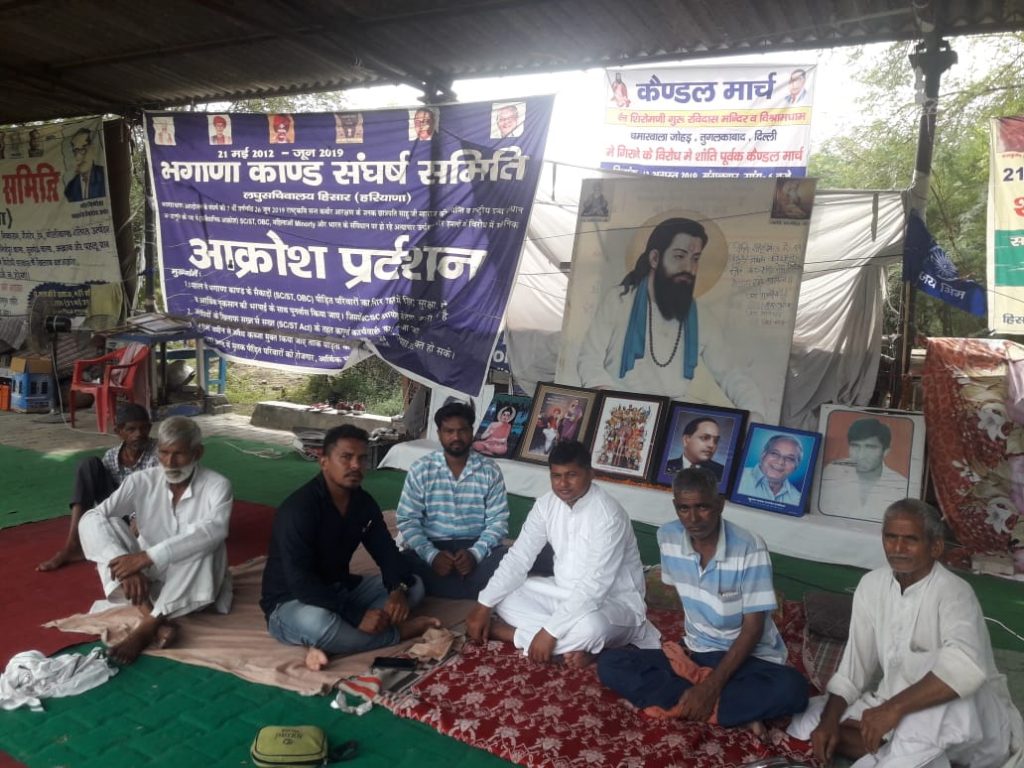Why hundreds of Dalits were unable to vote in Bhagana, Haryana

By Inder Bisht, TwoCircles.net
Initial reports from Haryana are indicating that neither the BJP nor the Congress is emerging as a clear winner in the state elections, with Dushyant Chautala’s Jannayak Janata Part likely to play the role of kingmaker.
However, for Dalits of Bhagana, democracy has already lost in its quest to provide them with their right to vote.
Scared of being attacked by the dominant members of their village, around 500 Dalit voters of Haryana’s Bhagana village skipped casting their votes on the Assembly elections on Monday.
These voters have been living outside their village since 2012 when following a land dispute between the Dalits and the dominant caste members of their village, the former were socially boycotted by the upper-castes resulting in the exodus of 138 Dalit families from the village.
For seven years, the Dalits have been protesting outside the premise of Hisar mini secretariat for their rights, compensation and demanding the prosecution of the perpetrators of crimes against them.
Despite the long passage of time, the Dalits say, that the animosity between them and some of the upper-caste people of their village hasn’t subsided, particularly because of the insistence of the protesters to demand prosecution of the people who had made them leave the village.
Given the circumstances, Satish Kajla, who has been leading the protest movement since it started in 2012, had requested the administration to shift some of the polling booths in the village near the Dalit homes. The demand, however, was not met.
“In the last Lok Sabha elections also, I had demanded that the place be declared as extremely sensitive and requested that the polling booths be made near the Dalit Basti. The administration declared the place extremely sensitive but didn’t accept our second demand,” said Satish Kajla.
Kajla said that this time he wrote to the District Election Officer and Central Election Commission about the fear of Dalit voters in casting their ballots in polling booths located near the residences of upper-caste people of Bhagana. But his demand was again turned down.

“They didn’t even declare the village as extremely sensitive like in the last Lok Sabha election,” claimed Kajla.
If a polling booth is declared sensitive or extremely sensitive, then additional security personnel must be deployed at the booths.
However, Kajla said that problem is not just at the polling booths only.
“If the booths are located at the other corner of the village, then we have to walk through the rows of houses of the same people who had persecuted us earlier. They still don’t let any opportunity slip by to hurl abuse and threaten us. Hence it’s important that the polling booths should be made near our houses,” Kajla added.
With a voter population of around 4,000, Bhagana has approximately 1,200 Dalit votes, out of which about 500 live outside of the village.
The Dalits who live outside Bhagana remain in contact with those Dalits who live in the village. However, physical contact rarely takes place due to the tense situation in their village.
Jagdish Kajla, a youth from Bhagana who now lives in Hisar, says that even fulfilling their religious and cultural customs is difficult for them as the village upper-castes don’t leave any opportunity to humiliate them.
“In our tradition when a person dies, people donate some firewood from each household of the community for the cremation. However in Bhagana, when we try to do that, the village upper-castes don’t let us collect wood from village land. So the enmity is still there,” Jagdish said.
Dalit rights activist Rajat Kalsan described the government decision to not install separate booths for the Dalits of Bhagana as 'prejudiced'.
“Right to vote is a constitutional right of every citizen. The government can make a special arrangement for security forces to be deployed in difficult places to help people cast their votes. But the fact that it ignored a similar demand of a section of the population with genuine reasons explains either the government thinks that they (Dalits) will not vote for them or perhaps just don’t care about them,” said Kalsan.
Kalsan said that there was a need to hear the fears of the marginal community of the village.
“In a place like Bhagana which has witnessed one of the most heinous caste atrocities in the country’s history, the administration should have heard the Dalits and tried to ameliorate their grievances. Their fears can’t just be removed by the bureaucratic thought process,” Kalsan added.
